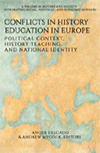
Conflicts in History Education in Europe
Political Context, History Teaching, and National Identity
Edited by:
Ander Delgado, University of the Basque Country
Andrew Mycock, University of Huddersfield
A volume in the series: History and Society: Integrating social, political and economic sciences. Editor(s): Jaan Valsiner, Niels Bohr Professor of Cultural Psychology, Aalborg University. Søren Dosenrode, Aalborg University. Mario Carretero, Universidad Autónoma de Madrid.
Published 2023
The heightened resonance of identity-driven politics in many states across twenty first century Europe emphasizes the critical role of history in shaping public contestation of the idea of the nation, and accordant manifestations of nationalism and national identity. How the past is interpreted or what and how is remembered has proven increasingly febrile, contentious, and divisive. Debates about history have gone beyond academia, and have permeated and polarised politics and society in many European countries. Intense debate and dispute about national history and culture has often focused on the history teaching in schools, colleges, and universities. According to the aforementioned, it is evident that the teaching of history in the classroom is a relevant topic within the educational system. For this reason, it is not surprising that many times the choice of what kind of history to teach becomes a controversial topic.
The existence in a given society of different visions about the nation or the various responses proposed to face the social challenges existing in it (immigration, independence nationalisms...) can turn the teaching of history into a debated and controversial topic. Logically, depending on the specific political context of each country, this debate can acquire different developments and characteristics. The school is not an institution isolated from its socio-political context. In fact, both areas constantly interact. Therefore, this book proposes an approach to this topic that tries to connect the specific political context of different countries with the debates about education and history teaching from 1990 until the present. It deals with the extent to which the social and political context affects the history teaching practice developed in the classrooms through the decisions made on the official curricula and textbooks. Emphasizing this connection between both aspects is one of the strengths of this book. That is the reason why this book proposes an approach to that reality from diverse points of view and show the different materializations observed in this area in the studied cases. The chapters of this volume allow us to verify this heterogeneous reality and help enrich our knowledge on this broad and interesting topic.
CONTENTS
Introduction, Ander Delgado and Andy Mycock. PART I: TEACHING OLD AND NEW EMPIRES. Understanding Empire in the 21st Century, Terry Haydn. Histories of an Old Empire: The Ever-Changing Acknowledgment of Dutch Imperialism as a Present Past, Maria Grever and Susan Lege ne. Breaking the Silence: Contemporary History Teaching About Italian Colonial Crimes, Giovanna Leone. Colonialism in Portuguese History Textbooks Since the 1990s: Still, Everything is Fine, Joaquim Pires Valentim and Isabel Miguel. PART II: NATIONAL IDENTIFICATION AND HISTORY TEACHING. The Public History of Heimat and the Schools, Marko Demantowsky. The Teaching of History in Federal Belgium: The Interplay Between Politics and History Curricula in a Nation-State in Decline, Karel Van Nieuwenhuyse, Jean-Louis Jadoulle, and Tom De Paepe. Do Basque Schools Create Basque Nationalists? The History Syllabus in a Divided Society, Ander Delgado. About the Authors.
-
Paperback979-8-88730-251-5
Web price: $45.04 (Reg. 52.99)
-
Hardcover979-8-88730-252-2
Web price: $80.74 (Reg. 94.99)
- eBook979-8-88730-253-9

- HIS035000 - HISTORY: Study and Teaching
- EDU016000 - EDUCATION: History
- HIS054000 - HISTORY: Social History
-
 Beyond the Dichotomy Between Altruism and Egoism
Society, Relationship, and Responsibility
Beyond the Dichotomy Between Altruism and Egoism
Society, Relationship, and Responsibility
-
 Educational Justice
Challenges For Ideas, Institutions, and Practices in Chilean Education
Educational Justice
Challenges For Ideas, Institutions, and Practices in Chilean Education
-
 Reproducing, Rethinking, Resisting National Narratives
A Sociocultural Approach to Schematic Narrative Templates
Reproducing, Rethinking, Resisting National Narratives
A Sociocultural Approach to Schematic Narrative Templates
-
 Sensuous Unity of Art and Science
The Times of Rudolf II
Sensuous Unity of Art and Science
The Times of Rudolf II
-
 Sticking Together
How Local Politicians Make Sense of and Respond to International Crises
Sticking Together
How Local Politicians Make Sense of and Respond to International Crises
-
 The Development of Social Knowledge
Towards a Cultural-individual Dialectic
The Development of Social Knowledge
Towards a Cultural-individual Dialectic
-
 Transterradas
Child and Youth Exile as a Place of Memory
Transterradas
Child and Youth Exile as a Place of Memory

